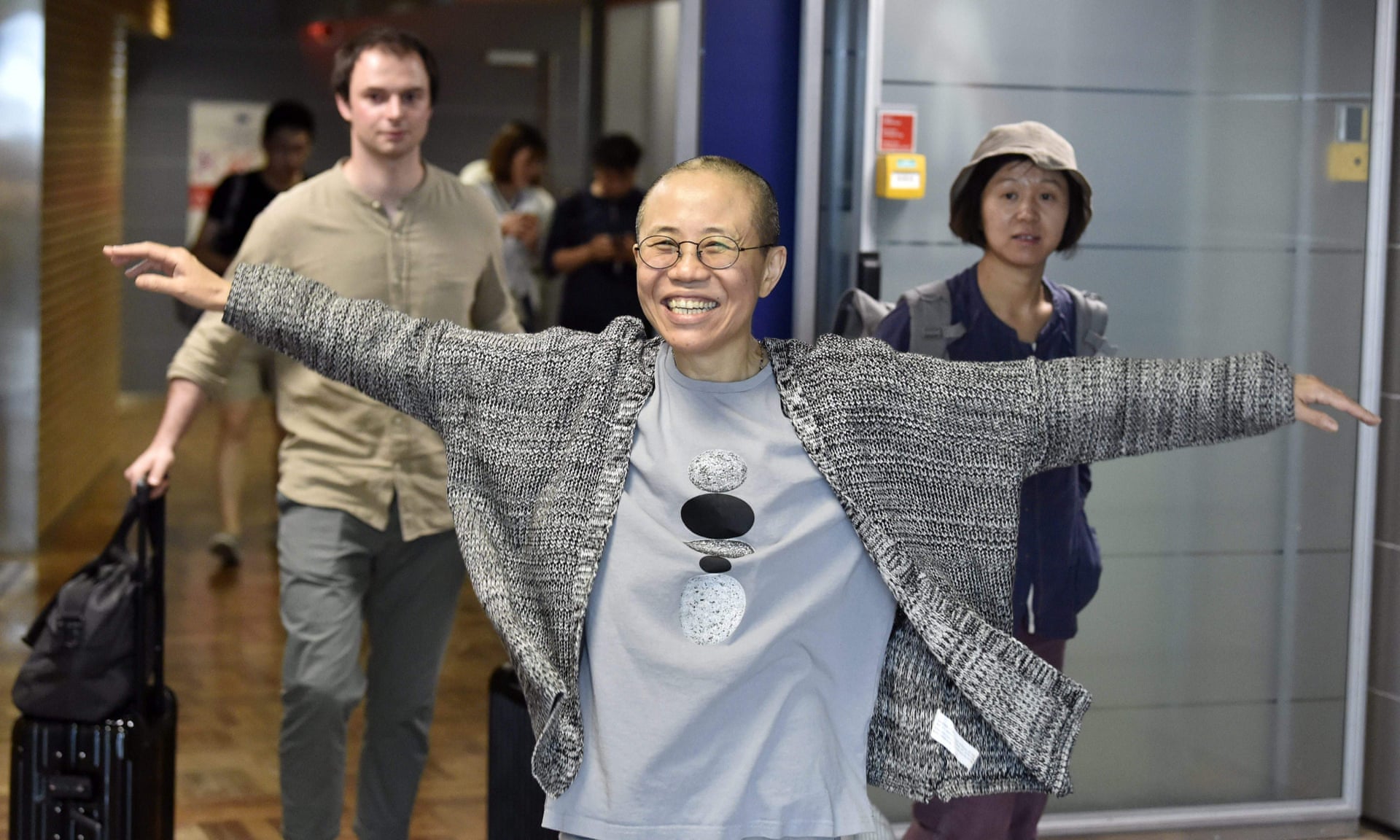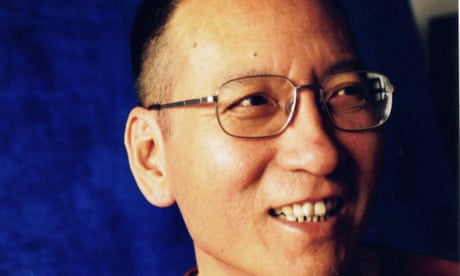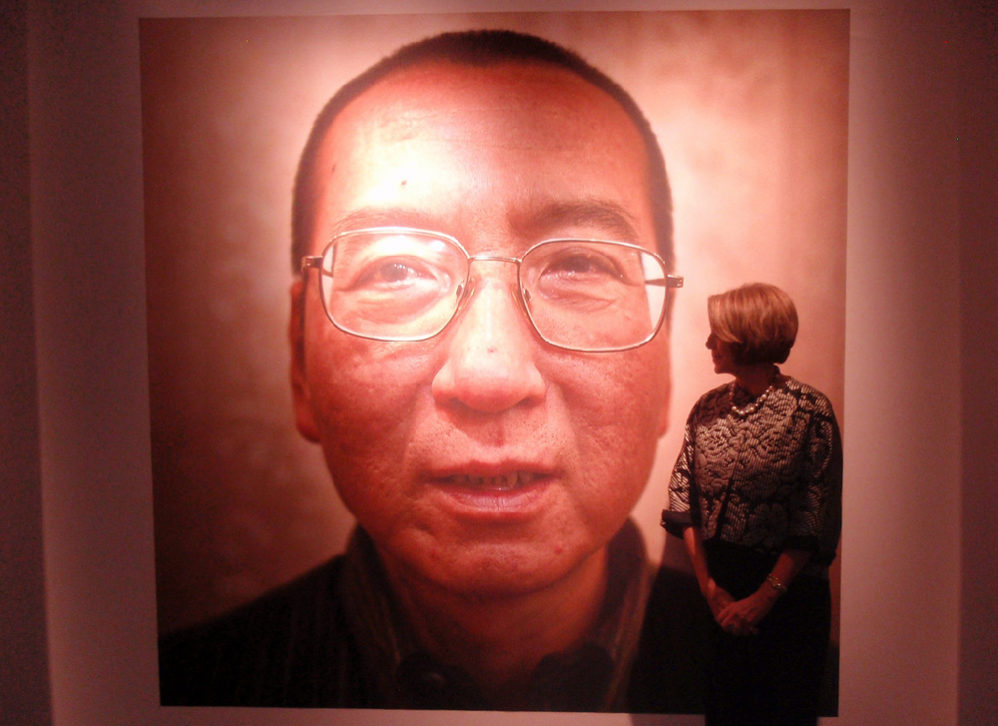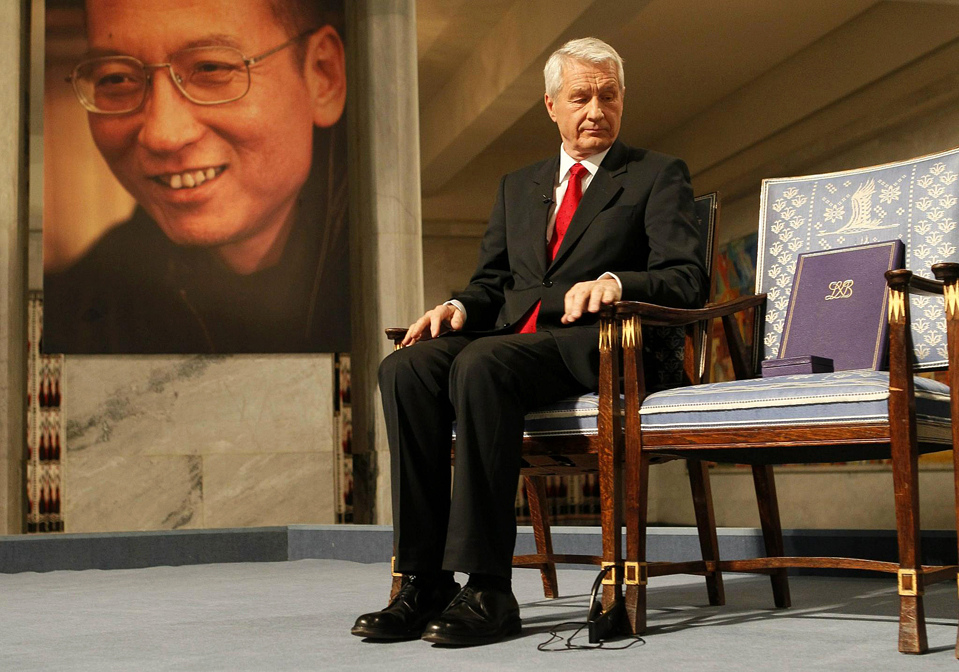By SUYIN HAYNES/TAIPEI

A sculpture of the Chinese Nobel peace prize recipient Liu Xiaobo who passed away one year ago can be seen outside City Hall on July 13, 2018, in Taipei, Taiwan.
Artist Aihua Cheng has worked feverishly for the past four months in her scenic Baisha Bay studio on Taiwan’s northern coast.

A sculpture of the Chinese Nobel peace prize recipient Liu Xiaobo who passed away one year ago can be seen outside City Hall on July 13, 2018, in Taipei, Taiwan.
Artist Aihua Cheng has worked feverishly for the past four months in her scenic Baisha Bay studio on Taiwan’s northern coast.
For her latest project, the oil painter and sculptor read the extended works of the late Chinese Nobel Peace Laureate Liu Xiaobo—while creating a three-part sculpture dedicated to the writer and dissident, who died as a political prisoner last year.
“I completed the work just yesterday,” she told TIME, shortly before her creation was shown to the public for the first time outside Taipei’s city hall on July 13.
Titled I Have No Enemies, Cheng’s piece incorporates a line drawing of Liu looking out over a bronze open book inscribed with his writings.
Titled I Have No Enemies, Cheng’s piece incorporates a line drawing of Liu looking out over a bronze open book inscribed with his writings.
“I hope that his books and thoughts can continue impacting China,” she says.
Unveiled on the one-year anniversary of Liu’s death, the sculpture was planned by exiled democracy activist Wu’er Kaixi as a tribute to his former mentor.
“Taiwanese people joining us in erecting this sculpture are telling China that we have not forgotten our values,” says Wu’er, who was forced to flee China after the Tiananmen Square protests and settled in Taiwan in 1996.
That message will resonate with many on this island, which began to embrace democracy after nearly four decades of martial law ended in 1987.
That message will resonate with many on this island, which began to embrace democracy after nearly four decades of martial law ended in 1987.
The mainland still views Taiwan, an island of 23 million people that lies 112 miles off China’s coast, as its sovereign territory despite the island’s breakaway in 1949 at the end of the Chinese Civil War.
Supported by Reporters Without Borders, the crowdfunded sculpture project is intended to represent the ideals of freedom and democracy championed by Liu in his co-authored Charter 08 manifesto.
Supported by Reporters Without Borders, the crowdfunded sculpture project is intended to represent the ideals of freedom and democracy championed by Liu in his co-authored Charter 08 manifesto.
Liu encouraged Chinese citizens to envisage a democratic future, “a modern means for achieving government truly ‘of the people, by the people, and for the people.’”
That document ultimately led to his arrest in 2009, his Nobel Peace Prize the following year and his imprisonment until he died from late-stage liver cancer.
But the commemoration of a Chinese dissident comes at a time when tensions with Beijing are already running high.
But the commemoration of a Chinese dissident comes at a time when tensions with Beijing are already running high.
Taiwan is struggling for international recognition as China ramps up efforts to isolate the island.
The day after the statue was unveiled, the head of China’s Taiwan Affairs office released a statement saying that “the vain separatist attempts for ‘Taiwan independence’ will only lead to a dead end.” Add an unpredictable U.S. President and a snowballing trade war between the world’s two biggest economies into the mix and you have a cross-strait relationship that is more fragile—and perhaps more dangerous—than ever.
When the news of Liu’s death was announced last year, Taiwan’s President Tsai Ing-wen tweeted a statement expressing Taiwan’s hopes that Chinese people could one day “enjoy the God-given rights of freedom and democracy.”
When the news of Liu’s death was announced last year, Taiwan’s President Tsai Ing-wen tweeted a statement expressing Taiwan’s hopes that Chinese people could one day “enjoy the God-given rights of freedom and democracy.”
The statement, issued in both Chinese and English, was seen as an affront to Beijing—much like Tsai’s presidential victory in January 2016.
Tsai’s Democratic Progressive Party promised “an era of new politics in Taiwan,” breaking with the Nationalist Party (KMT) government policy, which favored closer ties with China.
Tsai’s Democratic Progressive Party promised “an era of new politics in Taiwan,” breaking with the Nationalist Party (KMT) government policy, which favored closer ties with China.
Under the 1992 Consensus, China and Taiwan agreed that there is one China—allowing each other to disagree about the status of Taiwan.
Tsai’s election changed that.
Her party supports independence and refuses to acknowledge the Consensus.
Since Tsai took office in May 2016, China’s dictator Xi Jinping has not met with her but has continued relations with the KMT opposition party.
The lack of any diplomatic relations with Beijing does not seem to have deterred Tsai.
The lack of any diplomatic relations with Beijing does not seem to have deterred Tsai.
“She will continue to build on the belief that democracy can be integrated into an ethnically Chinese society and the idea that Taiwan can be an example to China in this sense,” says Sheryn Lee, a lecturer in security studies at Macquarie University.
Taiwan looks like the kind of society that Liu Xiaobo envisioned for China. That makes tributes to him contentious.
Taiwan looks like the kind of society that Liu Xiaobo envisioned for China. That makes tributes to him contentious.
According to Reuters, supporters of him and his widow Liu Xia were pressured by Chinese authorities to not hold any commemoration events.
And although Liu Xia was released from eight years of house arrest on July 10, the move came amid a growing crackdown on dissidents in China.
A day later, China sentenced prominent democracy activist Qin Yongmin to 13 years of imprisonment for “subversion of state power.”
As well as quashing dissent at home, Xi’s newly consolidated grip on power has allowed him to increase pressure on Taiwan—just as Tsai is trying to strengthen her position ahead of midterm elections in November.
As well as quashing dissent at home, Xi’s newly consolidated grip on power has allowed him to increase pressure on Taiwan—just as Tsai is trying to strengthen her position ahead of midterm elections in November.
“Beijing probably wants to remind the Taiwanese public that they are paying a price for supporting Tsai and her party,” says Richard C. Bush, former Chairman of the American Institute in Taiwan, the island’s de facto U.S. embassy.
A visible reminder of that price is the ratcheting up of military actions in the Taiwan Strait.
A visible reminder of that price is the ratcheting up of military actions in the Taiwan Strait.
In April, Chinese state media reported that the navy held its largest ever military display in a spectacular show of force in the South China Sea as well as the first naval military exercises with live fire drills in the strait since 2015.
Analysts say such exercises signal Beijing’s intention to send a message to the U.S. amid rising trade tensions and closer ties to Taiwan.
Analysts say such exercises signal Beijing’s intention to send a message to the U.S. amid rising trade tensions and closer ties to Taiwan.
While the U.S. formally endorses the “one China” policy, it has had an unofficial relationship with Taiwan since 1979.
And President Donald Trump has broken an un-precedented series of protocols since his Inauguration, such as accepting a congratulatory phone call from Tsai; passing the Taiwan Travel Act, which encourages U.S. officials to visit the island; and unveiling a new $250 million de facto embassy building in Taipei.
“No one really expected the level of interference that Trump had. He broke all of the rules that have been set down with China-Taiwan relations,” says Lee.
These moves have also been accompanied by gestures of U.S. military support for Taiwan, right under Beijing’s nose.
Last year, Trump approved a deal to sell Taiwan $1.42 billion worth of arms in a massive deal that was immediately condemned by China.
On July 7, two U.S. warships passed through the Taiwan Strait—merely a day after Washington imposed tariffs on $34 billion of Chinese imports in the last shot fired in the superpower showdown.
Despite Trump’s seemingly strong commitment to Taiwan, the backdrop of a trade war has nevertheless worried local politicians.
Despite Trump’s seemingly strong commitment to Taiwan, the backdrop of a trade war has nevertheless worried local politicians.
“We share the same fundamental values as the U.S.,” says Huang Kuo-chang, chairman of the pro-independence New Power Party.
“But we are not so naive as to be unable to understand that sometimes we become the bargaining chip between China and the United States.”
China has also accelerated efforts to diplomatically isolate the island.
China has also accelerated efforts to diplomatically isolate the island.
Since taking office, Tsai has lost allies in Burkina Faso, the Dominican Republic, Panama, and São Tomé and Príncipe, leaving only 18 others worldwide.
“Some say that in a few years, the number of allies Taiwan has could drop to zero,” says Rwei-Ren Wu, a research fellow at Taipei’s Academia Sinica.
A prominent advocate for Taiwanese independence, Wu was barred from entering Hong Kong to speak at a conference last year.
Taiwan aspires to be a member of the U.N., but is not officially recognized.
Taiwan aspires to be a member of the U.N., but is not officially recognized.
In May, for the second year in a row, it was denied access to the World Health Organization’s annual assembly—a move denounced by both Tsai’s government and independent watchdogs as a surrender to pressure from Beijing.
That pressure has started to affect private companies.
That pressure has started to affect private companies.
In recent months, airlines and retailers have clashed with Beijing over references to disputed territories, including Taiwan and Tibet.
In January, authorities shut down the Chinese websites of Marriott International after it listed Taiwan as an individual nation; in May, Gap apologized for a T-shirt with a map of China that omitted Taiwan.
Beijing has also demanded that foreign airlines edit references to Taiwan to reflect the island as part of the mainland.
Dismissed by the White House as “Orwellian nonsense,” U.S. airlines including Delta and American now have a July 25 deadline to comply with Beijing’s line on the issue.
In Taipei, the memorial sculpture is accompanied by an empty chair, symbolizing Liu’s absence at the 2010 Nobel Peace Prize ceremony because of his imprisonment.
In Taipei, the memorial sculpture is accompanied by an empty chair, symbolizing Liu’s absence at the 2010 Nobel Peace Prize ceremony because of his imprisonment.
Cheng acknowledges that a sculpture alone is unlikely to impact China.
“But I think the words, the thoughts of Liu Xiaobo will,” Cheng says.
The sculpture—previewed only briefly on July 13—is still waiting on permanent approval from the city.
For Taiwan too, the road ahead looks uncertain.
“There is no reason for us to be treated as second-class global citizens,” says Huang.
“If our goodwill toward China is unilateral, what do we gain from maintaining the status quo?”





















